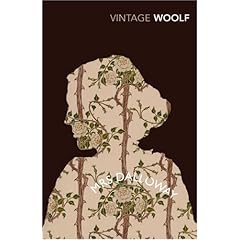 Claire {@ kissacloud} and three friends are doing a Woolf In Winter read-along. The first book they're tackling is Mrs. Dalloway, and it's being hosted by Sarah {@ what we have here is a failure to communicate}. I picked up the Vintage classic last year, while idly browsing a second hand book store, and have since been extremely ambivalent about it - mostly because I've never read a book by Virginia Woolf, and I have an inexplicable fear of the unknown, specially when it comes to much-acclaimed classics.
Mrs. Dalloway is probably the most difficult novel I've ever read. And, I'll go out on a limb and say it's probably (one of) the most difficult book(s) I'll ever read.
Claire {@ kissacloud} and three friends are doing a Woolf In Winter read-along. The first book they're tackling is Mrs. Dalloway, and it's being hosted by Sarah {@ what we have here is a failure to communicate}. I picked up the Vintage classic last year, while idly browsing a second hand book store, and have since been extremely ambivalent about it - mostly because I've never read a book by Virginia Woolf, and I have an inexplicable fear of the unknown, specially when it comes to much-acclaimed classics.
Mrs. Dalloway is probably the most difficult novel I've ever read. And, I'll go out on a limb and say it's probably (one of) the most difficult book(s) I'll ever read.
Woolf's meanderings is essentially a stream-of-consciousness-style narrative to provide an insight into the lives of a few Londoners, including the protagonist: Clarissa Dalloway, who is preoccupied with the last minute details of a party she is to give that evening. Yet, the book digresses between reality, flashbacks as well as imaginary visions of the characters, and these digressions are helped greatly by the complete absence of chapters, so that the reader is left trying to figure out which character's on centre-stage at any given point in time, and how their story fits in the grand scheme of things, the grand finale, the party.
Set in London, a few years after the first World War, Mrs. Dalloway unsurprisingly starts off with the spotlight on the protagonist herself, the wife of a politician, who is planning to throw a party. Yet, as the book progresses, and the clock on the Big Ben ticks, the spotlight falls on a myriad of characters including Peter Walsh, an ex-boyfriend of Mrs. Dalloway, who has just come back to London, and brings back old memories; Septimus Smith, a war veteran, who seems disconnected from the story, as he slips into insanity, haunted by the ghost of one of his friends who died during the war; doctors who attempt treating Smith; his worried wife, Rezia; Mrs. Dalloway's daughter Elizabeth, and Mrs. Dalloway's enemy, Miss. Kilman.
The story, in real terms, lasts just one day, but, with the many different perspectives that Woolf weaves in, it seems to last a lifetime (in a good way). It's sensitive, philosophical even, giving an insight into human nature as we don't really know it, but, emphasising, ever so subtly, on the appreciation of life, and the eventuality of death.
So, he was deserted. The whole world was clamouring: Kill yourself, kill yourself, for our sakes. But why should he kill himself for their sakes? Food was pleasant; the sun hot; and this killing oneself, how does one set about it, with a table knife, uglily, with floods of blood - by sucking a gaspipe?
It's a relatively short novel, at 172 pages. However, it took me over five hours to finish it, and all my concentration. There were sentences about fourteen lines long, there were connotations long-winded and intense, there were provoking thoughts that stayed on, long after you'd flipped the page. Yes, Mrs. Dalloway's primary preoccupation was with the party, and exulting in life's wake. She had married a man she presumably didn't love as much as she loved someone else. Yet, her character is anything but superficial, flawed with merits - or, should that be meritorious with flaws?
She muddled Armenians with Turks; loved success; hated discomfort; must be liked; talked oceans of nonsense; and to this day, ask her what the Equator was, and she did not know.
All the same that one day should follow another; Wednesday, Thursday, Friday, Saturday; that one should wake up in the morning; walk in the park; meet Hugh Whitbread; then suddenly in came Peter; then these roses; it was enough. After that, how unbelievable death was! - that it must end; and no one in the whole world would know how she had loved it all; how every instant...
The other thing I loved about this book was it's glimpses into London in the early 1900s. I thought that Woolf captured the heart and soul of central London beautifully (this book is mostly based in and around Westminster), and I actually felt that I was accompanying the characters, as they ambled the streets, or rode the Omnibus, or napped in Regents Park, or, for that matter, enjoyed the hustle-bustle at the Strand.
I am really pleased that I read this book, and I will be seeking another Woolf book sometime in the future, albeit, I don't think I can do four Woolfs in eight weeks - it's seriously hard work! Hats off to all those of you who are! Claire {@ Paperback Reader} and Rachel {@ Book Snob} recommended reading Michael Cunningham's The Hours after reading Woolf's masterpiece. Subsequently, I'll be reading it later this month.
Thanks to Claire {kissacloud}, Sarah {what we have here is a failure to communicate}, Emily {evening all afternoon} and Frances {Nonsuch Book} for hosting this wonderful read-along.